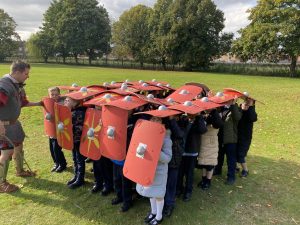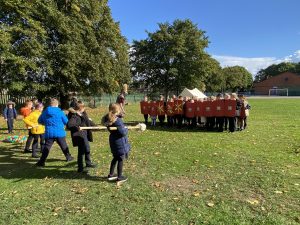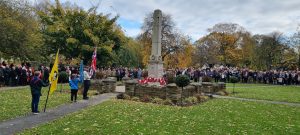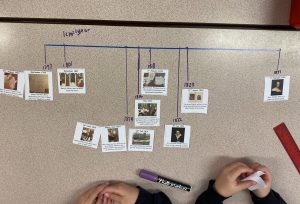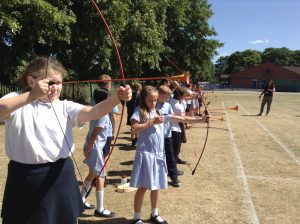Subject Leader : Lindsey Rawes
“History is who we are and why we are the way we are.”
David McCullough
History is about real people and real events from the past. History is concerned with sequence, time and chronology and is the study of evidence about the past; it gives us a sense of identity, set within our social, political, cultural and economic relationships. History fires the children’s curiosity about the past in Britain and the wider world: it plays an essential part in preparing us for living and working in the world today.
What they learn can influence pupils’ decisions about personal choices, attitudes and values. In History, children find evidence, weigh it up and reach their own conclusions. To do this they need to be able to research, sift through evidence, and argue for their point of view – skills that are all prized in adult life.
In History pupils will have the opportunity to:
- Develop a secure understanding of chronology and their place in it.
- Learn about the impact and achievements of Britain and others civilisations.
- Ask questions about the past and investigate these using a range of primary and secondary sources.
- Handle and use sources in the form of artefacts, photographs and written evidence.
- Make comparisons and explain why changes occur.
- Experience History brought to life in the form of living history days, workshops and visits to museums.
- Construct hypotheses and arguments about people and events from the past by looking closely at evidence.
- Challenge stereotypes by studying a rich and diverse range of individuals and cultures from the past.
How is the content / theme chosen?
The content is chosen to make effective links with key themes and ensure coverage of the expectations, as set out in the National Curriculum programmes of study, as well as the EYFS framework.
At Normanton Common Primary Academy we ensure a clear, sequenced progression, which is taught systematically for all pupils to acquire the intended knowledge and skills . The content may be adapted or changed, based upon the needs or interests of specific cohorts. Key threads run throughout the history curriculum, which help our children to retain and recall information as well as make direct links and comparisons. In Key Stage 1 our key threads are – Similarities and differences, Continuity and change and Significance and impact. In Key Stage 2 we make links around the key threads of –
Society & Relationships, Power, Achievement & Impact.
How do we ensure progression of knowledge and skills?
At Normanton Common Primary Academy we have in place, for each subject area, a knowledge and skills progression document, which is used for planning, to ensure sequenced and appropriate content for specific year groups. Teachers are clear on the learning and expectations for each year group, as this has been carefully selected and mapped out so that children are building on prior knowledge and skills each term and each year.
We plan for History using the National Curriculum objectives to ensure a robust and thorough approach. We also use a skills document to ensure progression through each knowledge block. Before each new unit of work is introduced teachers use a knowledge organiser to help them make links to knowledge that has been taught before and ensure a sequential approach to the teaching of technical vocabulary.
Click on the link below to see an overview of our History Curriculum:
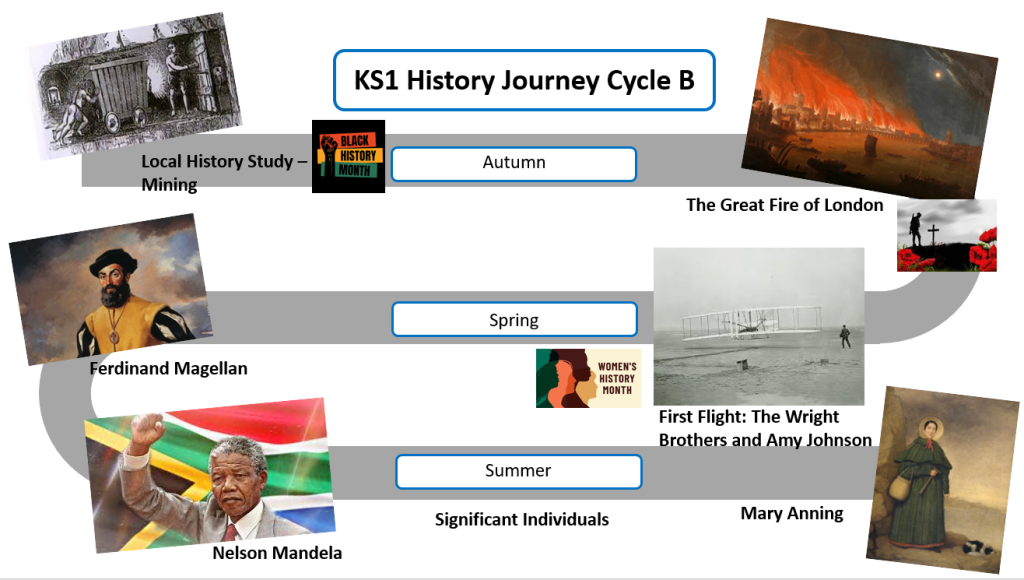
How is the subject taught?
History lessons are carefully planned through our themes, so that valuable links can be made across other subjects. A two year, long term rolling programme maps out the coverage of the discrete teaching and learning opportunities for children to develop and embed specific skills. This ensures coverage of the National Curriculum, for History across Key Stage 1 and 2 and work within and beyond the Early Years’ Framework across our Foundation Stage.
Within each discrete block of History teaching, class teachers carefully plan the specific outcomes for their year group, based upon age appropriate knowledge and skills, as well as the needs of the cohort or individuals within it. There is a strong focus on developing vocabulary of our children and retention of this. New vocabulary is taught, with the emphasis on key historical words and phrases . Although we actively introduce and are ambitious with the language we use, we understand the importance not to over complicate this language with very young children, but ensure underlying principles and meanings of the words are taught and understood.
Children are introduced to and reminded of key vocabulary. Questioning is used to check their understanding and prior knowledge, before new concepts, skills or knowledge are introduced.
Modelling is used by class teachers to clarify expectations, children are then given plentiful opportunities to consolidate, build upon and apply basic skills and knowledge, across a series of lessons, as well as across the year. When children are learning about a subject through a discrete teaching sessions they are explicitly told that today they are going to be ‘historians.’ They are then reminded of the key skills that they will learn, use and develop within this subject.
In History these are:
- place events in a chronological framework and develop a coherent understanding of chronology
- use primary and secondary sources to find evidence about people and events
- understand and explain the impact historical events have had on our locality and on the wider world
- understand the achievements of significant people and cultures from the past
- make comparisons about people and societies from the past
- communicate findings written and orally
History is one of our key subject drivers in developing the ‘Challenge & Educate’ side of our school curriculum. Through studying a range of people from the past and present, who have had an impact on the world, as well as a range of countries and cultures, children learn about and are taught to challenge stereotypes connected to gender, wealth, disability and cultural background. They are educated that differences should be celebrated and are not a barrier to achievement. History is a strand of the curriculum that runs throughout all subjects: pupils will study significant individuals from history throughout a wide range of subjects (i.e. famous scientists, naturalists, explorers, writers, artists, designers and many more).
Pupils also have additional opportunities to extend their History knowledge and skills through cross-curricular work. History underpins many subjects: strong links with other areas, particularly Geography, English, Science and Art, ensure that children have numerous opportunities to apply skills across the curriculum. Opportunities to learn about significant people, including artists, scientists, musicians and explorers are carefully chosen, so that children are continually developing the sense of the importance of History in the wider world and developing their understanding of chronology (for example, children might look at chronology of significant scientific discoveries during a unit of Science work on electricity).
Through studying a range of people and places in History, children are taught to challenge stereotypes connected to gender, wealth, disability and cultural background and are educated that differences, including where you are born or live in the world, should be celebrated and are not a barrier to achievement.
Texts relating to History knowledge and concepts used to further underpin this understanding and encourage questions from children. This ensures that elements of the History curriculum are accessed by children throughout the year.
Teaching History in EYFS
Planning and teaching in EYFS is similar to that in Key Stage 1. The children are expected to develop a specific set of skills and knowledge appropriate to their age. This is often beyond the expectations that are set out in the end of year Early Learning Goals, as we prepare our children with the knowledge and skills they will need in History, ready for year 1.
As well as topic work and the discrete teaching of skills and knowledge, children in EYFS are given the opportunity to explore, investigate, question and continually practise and embed their language and leaning through the areas of provision set up in the indoor and outdoor learning environments.
How do we know that our children are making progress?
Ongoing assessments of the children’s knowledge and skills is observed by the class teacher. Misconceptions are addressed and next steps carefully planned. Children’s outcomes are compared to the subject specific skills and knowledge documents. At the end of a block of discrete teaching (or term) subject leaders gather an overview of children’s outomes in each subject area. This is used to plan appropriate next steps for their future learning, as well as provide an overview of learning within a subject area across the whole school.
How do we promote our Curriculum Intent?
Active Learners:
- Pupils develop an interest and curiosity about the past
- Pupils develop a sense of pride about their place in the world
- Pupils have practical experiences to take part in hands on history learning such as handling and using a range of primary and secondary sources. (Further promoting engagement)
- Pupils have the opportunity to take part in living history events to experience what it was actually like to live in the past.
- Pupils develop their own research skills to find out about the past.
- Pupils present and articulate learning with confidence
- Pupils understand that some historical figures in the past have demonstrated resilience (they didn’t always achieve first time)
- Pupils collaborate in History projects with their peers.
- Pupils discuss questions about the past and give their own opinions.
- Pupils show pride in the presentation of their History work.
Active Citizens:
- Pupils learn about the impact people and events from History have had on their own lives. their locality and the wider world.
- Pupils understand the achievements of societies from the past.
- Pupils study the concept of power and how different societies have been ruled in the past.
- Pupils make comparisons between different cultures.
- Pupils begin to understand society and their place in it so that they develop a sense of their cultural heritage.
- Pupils develop an understanding that differences are not a barrier to achievement
- Pupils develop an understanding about living history and reflect on how this may have an impact on our World in the future.
Active Communicators:
- Historical vocabulary is shared in lessons and pupils use subject specific vocabulary.
- Pupils study a range of vocabulary rich texts (fiction and non-fiction) linked to their History learning.
- Pupils present their findings in writing and orally.
- Pupils ask and answer questions about the past.
- Pupils take part in debates about significant historical events or people
- Texts relating to historical events and people are planned to ensure progression and ambition between year groups.
- Pupils talk about people from the past, their achievements and impact.
What wider opportunities are provided for our children?
We ensure pupils experience many educational visits to ensure rich first hand experiences including: Eden Camp, The Yorkshire Museum, National Coal Mining Museum, Museum of Crime and Punishment, The The National Railway Museum and many others.
There are a range of wider opportunities for pupils to experience History: pupils take part in living history days or workshops run by experts in their field both in school and offsite at museums/living history sites. They are also able to handle real life artefacts through the loan of artefact boxes in class and examine these sources in detail. Pupils and their families participate in Inspire days often linked to our History learning throughout the year (most recently pupils and families enjoyed taking part in events based around the Stone Age and the Tudors).
Pupils also deepen their knowledge of the History curriculum through topic based homework grids, where they can choose to explore aspects of a historical period which are unable to be covered in class (e.g Roman food and drink, Tudor entertainment).
Our school also runs a number of competitions to promote pupils’ love of History throughout the year, including the Spirit of Normandy Trust VE Poster competition and the Historical Association’s Historical Fiction Writing competition for Years 5 and 6. Whole school assemblies and learning to commemorate significant historical events and anniversaries also run throughout the year (e.g. Remembrance week, Black History Month as well as one of events of historical significance such as the Queen’s Platinum Jubilee, King’s Coronation etc).
Knowledge Organisers:
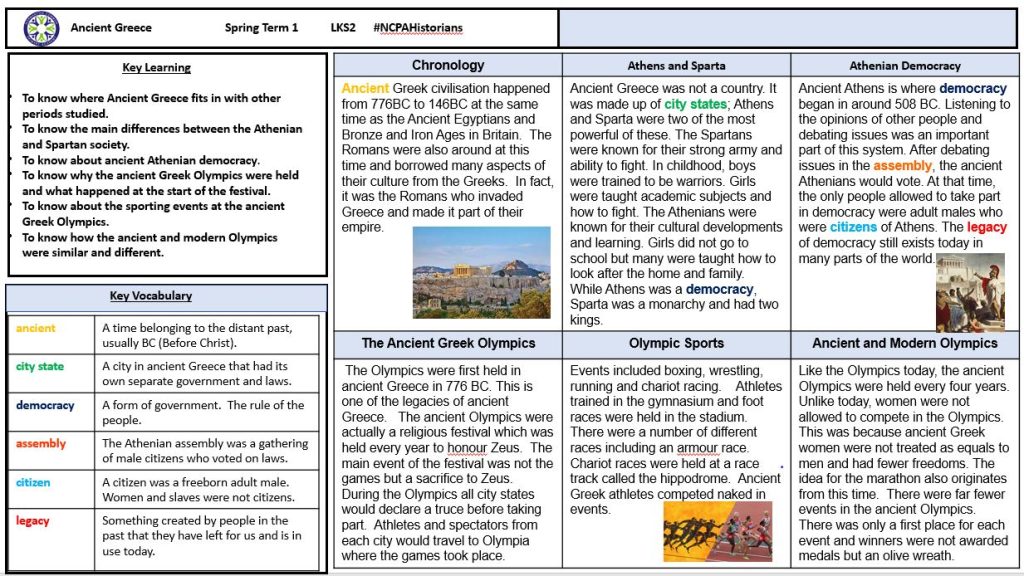
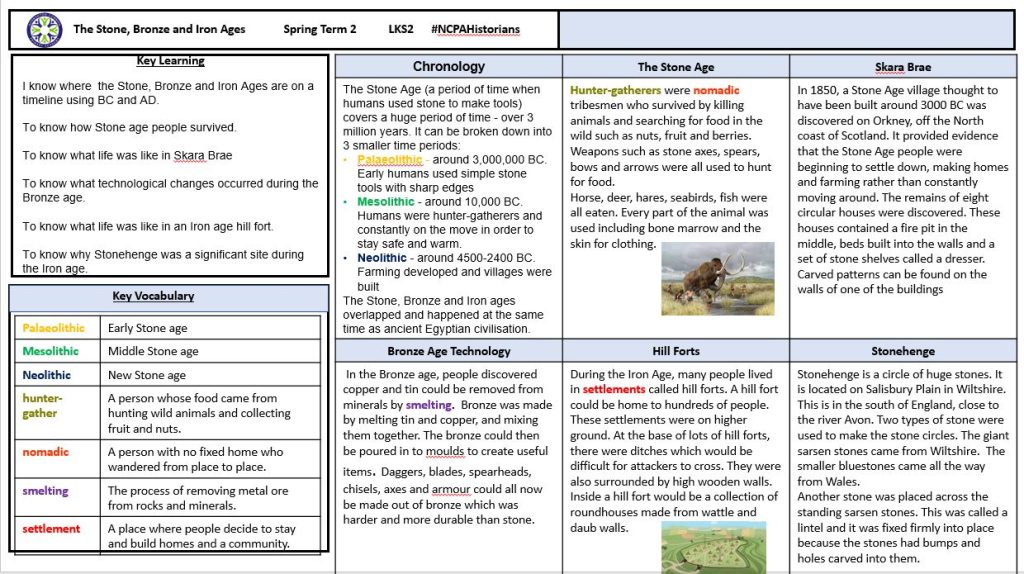
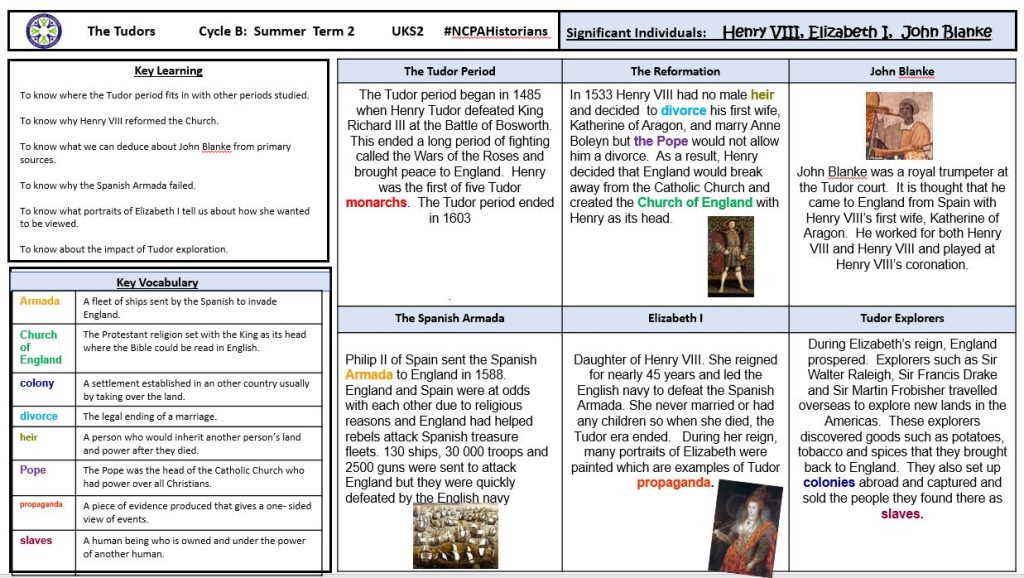
History in action...
